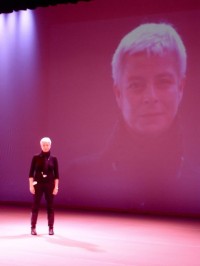
Hello world, happy new year.
Though I say it myself, I rather liked my Advent Calendar of 2008. It’s nicely ironic that I should have begun it with ‘Solving Musical Problems’, because as it turned out, that’s exactly what I continued to do for most of the calendar. One of the reasons I blog is because there are things that irritate me (both in the quotidian sense, and in the ‘sand that makes the pearl’ sense), and blogging is a way of working out those problems on virtual paper. Teachers acknowledge that you learn by teaching, and by the same token, I find it easier to solve problems when I share them with even an imaginary reading public.
My favourite post was the one about music that is too musical, because I surprised even myself in being able to find an advocate in one so erudite as Raymond Monelle for a position that seemed so illogical – that music that can be too “musical”.
But I now find that the concept of ‘musical music’ in a perjorative sense is not as recondite as I thought. It turns out that Mendelssohn used the term (I wish I knew where). That’s nice, because elsewhere, I’ve said that it was Chris Hampson who made me appreciate Mendelssohn, and it seems they might well have had stuff to talk about.
I came across this in Susanne Langer’s Feeling and Form. It’s a shame that Langer is dismissed as a bit of a well-meaning also-ran as a philosopher these days, because there are bits of her work which are brilliant.
“If the procedures of the several arts were really analagous, a composer could only translate that form into its musical equivalent.[…] But a shad0w-like following of verse forms and literary concepts does not produce a musical organism. […]Let Mendelssohn speak once more: “I can conceive music [for a poem] only if I can conceive a mood that produces it; mere artfully arranged sounds that aptly follow the accent of the words, forte on strong words and piano on mild ones, but without really expressing anything, I have never been able to understand. Yet for this poem I can’t imagine any other kind of music than this – not intensive, integral, poetic, but accompanying, parallel, musical music; but I don’t like that sort.”
Langer, Feeling and Form (1953, p. 159)
“What Mendelssohn called ‘musical music’ is something independent of the poem, externally similar in structure, but manufactured out of entirely independent material to “match” the verses, which remain essentially unchanged by it.” (ibid, p. 160). This isn’t the same thing as Monelle’s meaningless symphonism, but it’s another rather surprising view that music can be ‘over-musical’. And it makes perfect sense. Well, it will do, after another glass of wine.

